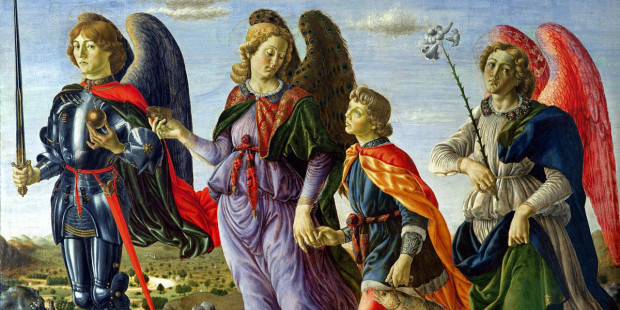 Angels are spiritual beings created by God, naturally invisible to the human eye, but all around us and constantly carrying out the tasks God has given them.
Angels are spiritual beings created by God, naturally invisible to the human eye, but all around us and constantly carrying out the tasks God has given them.
Traditionally the angels are classified into what are called nine “choirs” or “ranks.” This division is based on nine names of angels found in Sacred Scripture.
Saint Paul writes about them in his letters:
[May] The eyes of your heart [be] enlightened, that you may know what the hope is of the glory of his inheritance in the saints … Which he wrought in Christ, raising him up from the dead, and setting him on his right hand in the heavenly places. Above all principality, and power, and virtue, and dominion, and every name that is named, not only in this world, but also in that which is to come. (Ephesians 1:18, 20-21)
For in him were all things created in heaven and on earth, visible and invisible, whether thrones, or dominations, or principalities, or powers: all things were created by him and in him. (Colossians 1:16)
The Old Testament adds Cherubim and Seraphim (in multiple places) and “archangels” are named both in the New Testament (Gabriel, Michael) and in the Old Testament (Raphael and Michael).
St. Gregory the Great puts all of these “choirs” into a single list in one of his homilies. “We know on the authority of Scripture that there are nine orders of angels, viz., Angels, Archangels, Virtues, Powers, Principalities, Dominations, Throne, Cherubim and Seraphim.”
It is believed that each of these choirs was given a specific task by God. Theologian and philosopher Dr. Peter Kreeft gives a nice summary of these different choirs and their roles in his book Angels and Demons:
The first three levels see and adore God directly:
The seraphim, the highest choir, comprehend God with maximum clarity, and therefore their love flames the hottest. (“Seraphim” means “the burning ones.”) Lucifer (“Light-bearer”) was once one of them. That’s why he’s still very powerful and dangerous.
The cherubim contemplate God too, but less in himself than in his providence…(“Cherubim” means “fullness of wisdom.”)
The thrones contemplate God’s power and judgments. (Thrones symbolize judicial, juridical power.)
The next three choirs fulfill God’s providential plans for the universe, like middle management personnel:
The dominations or “dominions” (…”authority”), command the lesser angels below them.
The virtues receive their orders from the dominations and “run” the universe, so to speak, especially the heavenly bodies. (“Virtue” used to mean power, might, or energy.)
The powers serve the virtues by fighting against evil influences that oppose the virtues’ providential plan.
The last three choirs directly order human affairs:
The principalities care for earthly principalities, that is, cities and nations and kingdoms.
The archangels (such as Gabriel) carry God’s important messages to man.
Ordinary angels are the “guardian angels,” one for each individual.







